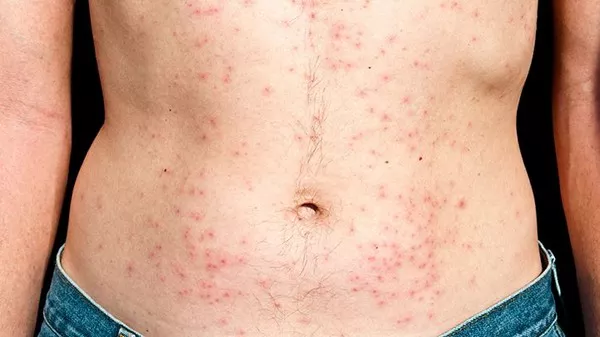Hives, also known as urticaria, are red, itchy, and swollen areas of the skin that can occur due to various triggers, including stress. When these hives are triggered by stress, they are often referred to as stress hives. This article delves into the causes of stress hives, the symptoms, and effective treatments to manage and alleviate this condition.
Understanding Stress Hives
What are Hives?
Hives are a reaction of the skin that results in raised, red, and itchy welts. These welts can vary in size and can appear anywhere on the body. They often come and go, with individual hives typically lasting less than 24 hours, though new ones can continue to appear.
How Stress Triggers Hives
Stress hives occur when the body’s response to stress causes the release of histamine and other chemicals from skin cells known as mast cells. This release results in inflammation and the formation of hives. While the exact mechanism of how stress triggers this release is not fully understood, it is known that stress can exacerbate or even trigger allergic reactions and skin conditions.
Symptoms of Stress Hives
Physical Symptoms
The primary symptoms of stress hives include:
- Red, raised welts on the skin
- Intense itching
- Swelling of the affected area
- Possible burning or stinging sensation
Psychological Symptoms
In addition to physical symptoms, stress hives can also lead to psychological distress, including:
- Increased anxiety due to the appearance and discomfort of hives
- Difficulty concentrating due to itching
- Sleep disturbances if hives appear at night
Diagnosis of Stress Hives
Medical History
A thorough medical history is crucial in diagnosing stress hives. Doctors will inquire about the onset of symptoms, potential triggers, and any related stressors in the patient’s life.
Physical Examination
A physical examination helps to confirm the presence of hives and to rule out other skin conditions that might present with similar symptoms.
Allergy Testing
In some cases, allergy testing may be performed to rule out other potential triggers of hives. This can include skin prick tests or blood tests to identify specific allergens.
Treatments for Stress Hives
Antihistamines
Antihistamines are the first line of treatment for hives. They work by blocking the action of histamine, thereby reducing itching and swelling. Common antihistamines include:
- Diphenhydramine (Benadryl): Effective but can cause drowsiness.
- Cetirizine (Zyrtec): Less sedating and effective for 24 hours.
- Loratadine (Claritin): Non-sedating and effective for 24 hours.
Corticosteroids
For severe cases of hives, corticosteroids may be prescribed. These medications reduce inflammation and can provide relief from severe symptoms. However, they are typically used for short durations due to potential side effects.
Stress Management Techniques
Mindfulness and Meditation
Practicing mindfulness and meditation can help reduce stress levels, which in turn may reduce the occurrence of stress hives. Techniques such as deep breathing exercises, progressive muscle relaxation, and guided imagery can be beneficial.
Regular Exercise
Exercise is a powerful stress reliever. Regular physical activity can help manage stress levels and improve overall well-being. Activities such as yoga, walking, and swimming can be particularly beneficial.
Cognitive Behavioral Therapy (CBT)
CBT is a type of psychotherapy that helps individuals identify and change negative thought patterns and behaviors. It can be highly effective in managing stress and reducing the occurrence of stress hives.
Adequate Sleep
Ensuring adequate and quality sleep is crucial for managing stress. Establishing a regular sleep routine and creating a calming bedtime environment can help improve sleep quality.
Home Remedies for Stress Hives
Cool Compresses
Applying cool compresses to the affected areas can help soothe itching and reduce swelling. Use a clean cloth soaked in cold water and apply it to the hives for 10-15 minutes.
Oatmeal Baths
Oatmeal has anti-inflammatory properties that can help soothe the skin. Adding colloidal oatmeal to a lukewarm bath can provide relief from itching and irritation.
Aloe Vera
Aloe vera gel can be applied topically to the hives to help soothe the skin and reduce itching. It has anti-inflammatory and cooling properties that can provide relief.
Avoiding Triggers
Identifying and avoiding potential triggers is crucial in managing stress hives. This includes avoiding known allergens, wearing loose-fitting clothing, and avoiding extreme temperatures.
SEE ALSO: Why Do I Keep Breaking Out in Itchy Hives?
Preventing Stress Hives
Stress Reduction Techniques
Implementing stress reduction techniques into daily life can help prevent the occurrence of stress hives. This includes regular exercise, mindfulness practices, and engaging in hobbies and activities that bring joy and relaxation.
Healthy Diet
Maintaining a healthy diet can also help manage stress levels and reduce the risk of hives. A balanced diet rich in fruits, vegetables, whole grains, and lean proteins can support overall health and well-being.
Hydration
Staying well-hydrated is important for overall health and can help keep the skin healthy and less prone to irritation.
When to See a Doctor
Severe Symptoms
If hives are accompanied by severe symptoms such as difficulty breathing, swelling of the face or throat, or a rapid heartbeat, it is crucial to seek immediate medical attention as these can be signs of a severe allergic reaction known as anaphylaxis.
Chronic Hives
If hives persist for more than six weeks, they are considered chronic. Chronic hives may require further evaluation and treatment by a healthcare professional.
Lack of Improvement
If home remedies and over-the-counter treatments do not provide relief, it is important to consult a doctor for further evaluation and treatment options.
Conclusion
Stress hives can be a distressing condition, but there are numerous strategies and treatments available to manage and alleviate symptoms. Understanding the triggers, implementing stress management techniques, and utilizing appropriate treatments can help individuals manage stress hives effectively. If symptoms persist or worsen, seeking medical advice is essential to ensure proper diagnosis and treatment.
Related Topics:


























